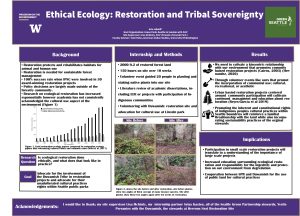ETHICAL ECOLOGY: RESTORATION AND TRIBAL SOVEREIGNTY
Industrialization has burdened the global environment causing astronomical amounts of degradation, and we are running out of time to protect the longevity of the biosphere. Ecological restoration is an incredibly important tool to mitigate the effects of environmental defilement, as it fights against and heals the abuse bestowed upon the planet and its people. We, as humans, have the utmost responsibility to uphold the health and wellness of our biosphere and its stewards. However, it is not as simple as digging up weeds and planting more trees. To develop a conception of best practices for ecological restoration, I worked to restore approximately 2000 ft. of urban forest land within Lincoln Park, talked to local tribal leaders of the Duwamish tribe and visited their ecological restoration site, scoured academic databases for case studies and ethics-based environmental restoration projects, and have been advocating, with consent, for the acknowledgment of inherent rights of unadulterated Duwamish use of Lincoln Park for cultural practices. With the inclusion of community participation and education using urbanized restoration projects, large-scale restoration becomes much more achievable. The incorporation of indigenous stewards is paramount to rebuilding a kincentric relationship with nature and restorative ecology, striving against the indoctrination of an authoritative relationship over nature. As we begin to hold each other accountable for the preservation and continued protection of our natural ecosystems large-scale projects will become more attainable, thus having a greater positive impact on the health of the global environment.
